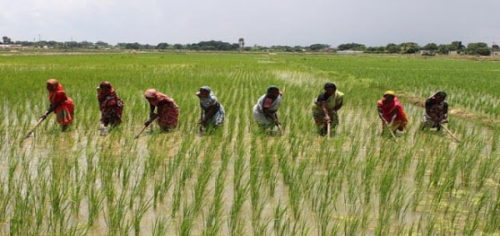
No doubts, the administration of President Muhammadu Buhari has restated in its diversification that agriculture, solid minerals and manufacturing were the key sectors identified to jumpstart the country’s economy, which has gone into its first recession in a decade. Obviously, the slide in the crude oil price was an eye opener to the present administration, which has been under intensive pressure to revive the ailing economy through its economic policies.
Basically, having identified the three sectors as alternatives to Nigeria’s economic recovery, President Buhari and his cabinet went back to the drawing board and tinkered on economic policies that will bring instant positive impacts on the ailing economy.
However, without mincing words, the president acknowledged that his administration would place key priorities on agriculture to ensure national food security before exportation of food products in Nigeria. Besides, he stressed that Nigeria being a mono-economy which is dependent on oil and with a teeming unemployed youth population, the way out of the current slump in the global oil market, was for the administration to focus on agriculture.
New Agric policy
In order to revamp the country’s agric sector, the Federal Executive Council (FEC) met in Abuja last year to approved a new agric policy titled: ‘Agriculture Promotion Policy (APP) (2016 – 2020).
According to government, the new policy was meant to refocus and reform the country’s agriculture after years of neglect and obsolete policies, which have engendered growth and development in the sector. Obviously, the focus of the new reform policy was on rebuilding a sector whose relevance had shrunk drastically, which was reflected in the lack of lending to farmers by the financial system and the dramatic levels of food imports from across the world.
Agric budget palava
However, there is no gainsaying that the present administration had agriculture in its heart as it moves towards achieving economic development, but the malaise facing the sector is enormous and not being tackled head-on.
Particularly, the Minister of Agriculture and Rural Development, Chief Audu Ogbeh, rued that the budget for his ministry in the 2016 appropriation bill was N34 billion. According to him, the budget allocation was inadequate for the ministry to resolve the numerous challenges in the country’s agric sector.
Ogbeh disclosed that the ministry inherited a debt of N87 billion from the previous administration as allegedly claimed by the agro-dealers of fertilizer distribution, saying the debt surpassed the entire total budget of N34 billion of the ministry and caused inadequacy in the country’s fertilizer distribution channels. He said the state of the fertilizer industry was disturbing and a call for concern for this present administration.
However, the inadequate budget is slowing down growth and development in the industry as the ministry is facing shortfall in meeting the demands in the industry.
Presidency’s perspective
However, last Sunday, in a statement, the presidential spokesman, Garba Shehu, said that efforts to get the nation out of its present economic challenges was beginning to yield positive results, especially in the area of agriculture. According to him, an increase in the volume of rice production and processing across the country was already saving the country a lot of foreign exchange.
Shehu, who is the Senior Special Assistant on Media and Publicity to the President, said that Nigeria only imported 58,000 tons of rice from Thailand in 2015 as against 1.2 mil-lion tons in 2014.
He said that due to the country’s growing rice production occasioned by the Central Bank of Nigeria (CBN)’s decision to halt foreign exchange for the importation of rice, “parboiled rice mills” in some Asian countries were shutting down production.
According to him, this is because Nigeria, which is one of the world’s largest importers of rice, no longer buys rice from them. “Five of such mills in Thailand servicing Nigeria have stopped production due to the withdrawal of our patronage,” he added.
According to him, the government is watching with keen interest the growing investment in rice milling by the private sector.
Stakeholder’s view
Women leader, All Farmers Association of Nigeria (AFAN), Hajia Halimat Njodgbodi, said that the Presidency’s reaction that agriculture is thriving in this on-going economic recession is not in tandem with the realities on the ground, adding that all is not yet well with the sector. She explained that many challenges are bedeviling the industry, stressing that many farmers in the country are still facing challenges relating to farmland issues, crop disease invasion, funding and lending to procure agricultural machinery.
Conclusion
Although the Federal Government has encouraged and demonstrated its zeal to boost Nigeria’s agric sector, but Nigerians are yet to see neither reduction in prices of foodstuff nor interest rates for farmers. It is only when Nigerian farmers can compete with their foreign counterparts that the country can start exporting and earning foreign exchange.
END

Be the first to comment